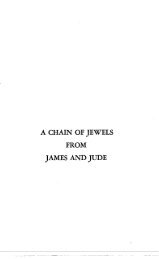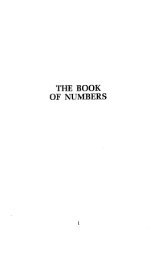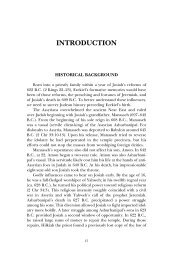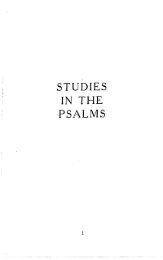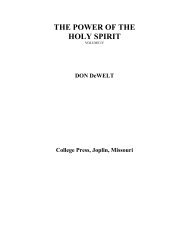- Page 1 and 2:
GENESIS THE BOOK OF THE BEGINNINGS
- Page 3 and 4:
BIBLE STUDY TEXTBOOK SERIES GENESIS
- Page 5 and 6:
COMMON ABBREVIATIONS art,, article
- Page 7 and 8:
CG Adam Clarke, Commentary: Genesis
- Page 9 and 10:
ISA Herbert Wendt, In Search of Ada
- Page 11 and 12:
PURT Erich Frank, Philosophical Und
- Page 13 and 14:
ADDITIONAL SPECIFIC ABBREVIATIONS (
- Page 15 and 16:
CYI'H William Smith and Wilbur Fiel
- Page 17 and 18:
NG Frederick W, Robertson, Notes on
- Page 19 and 20:
CONTENTS Part Twenty-five: The Gene
- Page 21:
GENESIS THE BOOK OF THE BEGINNINGS
- Page 24 and 25:
” . ii :27-32 GENESIS that shall
- Page 26 and 27:
11 :27-32 GENESIS ing of the phrase
- Page 28 and 29:
1-1‘: 2 7 - 3 2 the generations o
- Page 30 and 31:
1;1:27-32 GENESIS :$#: -; Hebrews.
- Page 32 and 33:
11 :?7-32 GENESIS it is the city of
- Page 34 and 35:
11 :27-32 GENESIS were two bawdred
- Page 36 and 37:
11 :27-32 GENESIS (6) “Terah live
- Page 38 and 39:
11. :27-32 GENESIS the Scripture (s
- Page 40 and 41:
11 :27-32 GENESIS (BA, 5 5-56) :
- Page 42 and 43:
11 ~27-32 GENESIS well say, for cen
- Page 44 and 45:
11 :27-32 GENESIS her name was Isis
- Page 46 and 47:
11 27-32 GENESIS be brought to the
- Page 48 and 49:
11 :27-32 GENESIS Chesed descended
- Page 50 and 51:
11 :27-32 GENESIS t -*’ - knowled
- Page 52 and 53:
11’:27-32 ’ narrated, but is, o
- Page 54 and 55:
11 :27-32 GENESISti,‘:,;‘ grows
- Page 56 and 57:
‘ F 11 :27-32 GENESIS in Haran, a
- Page 58 and 59:
I1 :27-32 GENESIS 17. Name the thre
- Page 60 and 61:
38 I
- Page 62 and 63:
NOTES- a. The above information is
- Page 64 and 65:
I2:1-20 GENESIS , shall see thee, t
- Page 66 and 67:
12:l-20 GENESIS ruler. This Empire
- Page 68 and 69:
12:l-20 GENESIS 20,000 cuneiform ta
- Page 70 and 71:
12:l-20 GENESIS made by the joint e
- Page 72 and 73:
12:l-20 GENESIS to furnish some imp
- Page 74 and 75:
12:l-20 GENESIS 6 family, and confi
- Page 76 and 77:
12:l-20 GENES IS and are still the
- Page 78 and 79:
12: 1-20 GENESIS boon of his good-w
- Page 80 and 81:
12:l-20 GENESIS ‘(18:17-19); a pr
- Page 82 and 83:
12:2, -3 GENESIS,. ~ 1 thing of- it
- Page 84 and 85:
- - - 12:4, f GENES12 -; Sarai and
- Page 86 and 87:
12:4, 5 GENES1 storied ziggurat (cf
- Page 88 and 89:
12
- Page 90 and 91:
12:5 GENESIS ::> r‘ days. The obj
- Page 92 and 93:
12:6, 7 GENESIS : : 8 profane place
- Page 94 and 95:
12:6, 7 GENESIS :2: was typical of
- Page 96 and 97:
12:7, 8 GENESIS A ’ ‘ ‘ which
- Page 98 and 99:
12:lO-20 GENESIS 7. The Roztnd Trip
- Page 100 and 101:
12 : 10-20 GENESIS relieve the mind
- Page 102 and 103:
12 : 10-20 GENESIS would have us kn
- Page 104 and 105:
12 : 10-20 GENESIS fines of Egypt,
- Page 106 and 107:
12:lO-20 GENESIS as to the relation
- Page 108 and 109:
12 : 10-20 GENESIS suppositibn that
- Page 110 and 111:
12: 10-20 GENESIS world whose honor
- Page 112 and 113:
12:lO-20 GENESIS Recapihdation: Lea
- Page 114 and 115:
3’1. 3 2. 33. 3 4. 3 5. 3 6. 3 7.
- Page 116 and 117:
12:lO-20 68. What evidence do into
- Page 118 and 119:
13;1-18 1 14 And Jehovah said unto
- Page 120 and 121:
13:1-18 GENESIS nephew with unfaili
- Page 122 and 123:
13:1-18 cities, as also Kyle’s in
- Page 124 and 125:
13:1-18 GENESIS it apparently bore
- Page 126 and 127:
14: 1-20 taww. 8 And there went out
- Page 128 and 129:
14:l-12 GENESIS victims of the vile
- Page 130 and 131:
14:l-12 GENESIS this brief account,
- Page 132 and 133:
14:l-12 GENESIS Eshcol, and Mamre,
- Page 134 and 135:
14:1, 9 GENESIS wells to the south
- Page 136 and 137:
14:1-9 GENESIS with the indicated e
- Page 138 and 139:
14:8-12 GENESIS this alliance, The
- Page 140 and 141:
14:13-16 GENESIS identified with th
- Page 142 and 143:
14:17-24 GENESIS is suggested in a
- Page 144 and 145:
14: 17-24 GENESIS emphasized repeat
- Page 146 and 147:
tt: 17-24 .. GENESIS , .T I I I ido
- Page 148 and 149:
~1!4:17-24 GENESIS : 4 ~ *9:2, 21:7
- Page 150 and 151:
14:17-24 GENESIS 1) real life-ident
- Page 152 and 153:
17-24 GENESIS : st be regarded as s
- Page 154 and 155:
14: 17-24 GENESIS 2% z‘ e,’ Ima
- Page 156 and 157:
14: 17-24 natilral exception must b
- Page 158 and 159:
14: 17224 GENESIS * :* ," sages. in
- Page 160 and 161:
14: 17-24 GENESIS related in Genesi
- Page 162 and 163:
GENESIS Prov. 1:10, 4:14, 9:6; 2 Co
- Page 164 and 165:
GENESIS one and the same event-the
- Page 166 and 167:
GENESIS priest (or even some suprem
- Page 168 and 169:
GENESIS made higher than the heaven
- Page 170 and 171:
GENESIS ness instead of reclining o
- Page 172 and 173:
27. 28. 29. 3 0. 3 1. 32. 33. 3 4.
- Page 174 and 175:
PART TWENTY-EIGHT 1 THE STORY OF AB
- Page 176 and 177:
1 5 : 1-21 GENESIS I phetic disclos
- Page 178 and 179:
15:1, 2 GENESIS x : % e ‘ A ~ 7 -
- Page 180 and 181:
3 1 5 :3-5 GENESIS dress .and shows
- Page 182 and 183:
lf:6 GENESIS * , attitude, a positi
- Page 184 and 185:
15 ;2-7 GENESIS v. 2, in token of h
- Page 186 and 187:
15:7, 8 GENESIS liverance.” (Cf,
- Page 188 and 189:
15 : 12-17 GENESIS chequered fortun
- Page 190 and 191:
1$:12-17 the land of this servitude
- Page 192 and 193:
15 : 12-17 GENESIS period of 400 ye
- Page 194 and 195:
15:12-17 ’ GENESIS . southern lim
- Page 196 and 197:
17:12-17 GENESIS has dug up thousan
- Page 198 and 199:
1 m?-17 GENESIS from the entrance o
- Page 200 and 201:
15:12-17 GENESIS and many of the ea
- Page 202 and 203:
15: 12-17 GENESIS the seed of Abrah
- Page 204 and 205:
15 : 17-2 1 GENESIS sign of the Cov
- Page 206 and 207:
1 I: 17-21 GENESIS passage, stating
- Page 208 and 209:
11:17-21 GENESIS Schultz (OTS, 34):
- Page 210 and 211:
e- . . GENESIS ’.7 - 4 % satisfyi
- Page 212 and 213:
* , between human beings; rights to
- Page 214 and 215:
GENESIS : In the New Testament we K
- Page 216 and 217:
GENESIS vate the Spiritual Life her
- Page 218 and 219:
“ GENESIS’.’ liisdnatural lif
- Page 220 and 221:
10; 2 Tim. 4:l; 1 1. Show the falla
- Page 222 and 223:
0 . 35. 3 6. 37., 3 8. 39. 40. 41.
- Page 224 and 225:
PART TWENTY-NINE THE STORY OF ABRAH
- Page 226 and 227:
16: 1-16 GENESIS The consequences o
- Page 228 and 229:
16~1-16 GENESIS of the secondary wi
- Page 230 and 231:
16:l-16 GENESIS irreverent use of t
- Page 232 and 233:
16~1-16 GENESIS (cf. 30: 3). Sarah,
- Page 234 and 235:
16~1-16 GENESIS Secondly, it involv
- Page 236 and 237:
16:1-16 GENESIS well to have, or co
- Page 238 and 239:
16: 1-16 GENESIS 4. The Angel of th
- Page 240 and 241:
16:l-16 GENESIS tinction is that be
- Page 242 and 243:
1.6: l-ldj ’ GENESIS I ; ; - ’.
- Page 244 and 245:
116: 1-16 GENESIS 1 1 ‘1 , ‘ J
- Page 246 and 247:
16:l-16 GENESIS’< ravaging ifiroa
- Page 248 and 249:
16:l-16 GENESIS but their will, and
- Page 250 and 251:
I FOR MEDITATION AN RMONIZING Isa.
- Page 252 and 253:
GENESIS ‘’-’ ment that ennobl
- Page 254 and 255:
’ GENESIS ; of Rahab as an exampl
- Page 256 and 257:
GENESIS down by Jesus, and confirme
- Page 258 and 259:
1 ’ GENESIS‘, 1 Only Begotten.
- Page 260 and 261:
GENESIS 21. How does the legal back
- Page 262 and 263:
PART THIRTY THE STORY OF ABRAHAM: T
- Page 264 and 265:
17:l-27 GENESIS quires clear promis
- Page 266 and 267:
17:l-27 . GENESIS 7, upon God” (c
- Page 268 and 269:
17: 1-27 GENESIS modern analytical
- Page 270 and 271:
17: 1-27 GENESIS tion of these phra
- Page 272 and 273:
17: 1-27 GENESIS 1 Thess. 1:9; Heb.
- Page 274 and 275:
1%; 1-27 ’ GENESIS,, . :g:*F; of
- Page 276 and 277:
17:1-27 (IHR, 68 ff.) : “The most
- Page 278 and 279:
‘17: 1-27 GENESIS 4- ‘ self) is
- Page 280 and 281:
17: 1-27 GENESIS for the purpose of
- Page 282 and 283:
i7:l-27 1 ‘The follawing ) is wor
- Page 284 and 285:
17:l-27 GENESIS ‘* Israelite stoc
- Page 286 and 287:
. 1Z:1-27 the Law of Moses (Lev. 12
- Page 288 and 289:
17:1-27 GENESIS regarded as queer.
- Page 290 and 291:
17:1-27 GENESIS Sarah laughed in un
- Page 292 and 293:
17:1-27 GENESIS The prompt obedienc
- Page 294 and 295:
17:1-27 I GENESIS To summarize: “
- Page 296 and 297:
GENESIS tions. We hear it said even
- Page 298 and 299:
GENESIS and we appropriate the bles
- Page 300 and 301:
GENESIS . God’s promise that on c
- Page 302 and 303:
GENESIS ’ bly. The Decalogue is n
- Page 304 and 305:
GENESIS automatically abrogates all
- Page 306 and 307:
Covenapt: by fleshly .circumcision
- Page 308 and 309:
GENES1 a word, spiritual circumthio
- Page 310 and 311:
GENESIS- -1 of the First Adam, it h
- Page 312 and 313:
8 1 ’ GENESIS ‘ the case, canno
- Page 314 and 315:
17. What was the con the terms of .
- Page 316 and 317:
GENESIS I-’ 46. What was Abraham
- Page 318 and 319:
79 I 80. 81. 82. 83. 84. 85. GENESI
- Page 320 and 321:
18:l-33 GENESIS - 1. 2 noon hour is
- Page 322 and 323:
18: 1-33 GENESIS went his way. The
- Page 324 and 325:
18: 1-33 GENESIS the story of Abrah
- Page 326 and 327:
18: 1-3 3 GENESIS she had both atta
- Page 328 and 329:
18:1-33 GENESIS Sodm and Gmorrah is
- Page 330 and 331:
18:1-33 GENESIS a promise of his fu
- Page 332 and 333:
18: 1-33 GENESIS entire population;
- Page 334 and 335:
18:1-33 GENESIS as he hopes that Lo
- Page 336 and 337:
18: 1-33 GENESIS that was set befor
- Page 338 and 339:
18 : 1-313 p . GENESIS constant and
- Page 340 and 341:
18:l-33 --even as it is u im~ortali
- Page 342 and 343:
men. , . , He adds: ‘On re the li
- Page 344 and 345:
1 0 ” > I 5 fj F: 18:l-33 GENESIS
- Page 346 and 347: GENESIW‘*I pitiatory sacrifice, G
- Page 348 and 349: GENESIS &id ’ of his own sins (cc
- Page 350 and 351: 7 , GENESIS $-;2 , the moral laws o
- Page 352 and 353: GENESIS covenant which bas been sea
- Page 354 and 355: 5 I ‘GENESIS 13.. Did Abraham‘s
- Page 356 and 357: PART THIRTY-TWO THE STORY OF ABRAHA
- Page 358 and 359: 19:1-38 GENESIS and go on your way.
- Page 360 and 361: 19: 1-3 8 GENESIS stock” the whol
- Page 362 and 363: 19:l-38 -who thereby aband human di
- Page 364 and 365: 1931’3 8 ‘ GENESIS he had been
- Page 366 and 367: 19: 1-38 Lot’s irresoluteness mak
- Page 368 and 369: 19~1-38 GENESIS island of Lesbos wh
- Page 370 and 371: 19,: 1 -3.8$ ; enslaved by it, and
- Page 372 and 373: 19:1-38 s I. Lot’s Delive *I2 And
- Page 374 and 375: - Lot's Reluctance. "When tu "morni
- Page 376 and 377: f9:1-38 couple‘d with ”fear tha
- Page 378 and 379: 256) : “Whateyer it and New “Te
- Page 380 and 381: 19: 1-3 8 GENESIS ”!’Lh. ardly
- Page 382 and 383: 1,9:1-38 . GEP$ES;[S i'st due, appa
- Page 384 and 385: 19~1-3 8 GENES1 which, in the vicin
- Page 386 and 387: 19~1-38 GENESIS judgment (though te
- Page 388 and 389: 19: 1-3 8 GENESIS with &m, that we
- Page 390 and 391: 19: 1-3 8 GENESIS resolved to procu
- Page 392 and 393: 19:l-38 GENESIS occurred only this
- Page 394 and 395: 19~1-38 GENESIS made by individuals
- Page 398 and 399: 19:1-38 GENESIS I; ‘wonted course
- Page 400 and 401: 19~1-38 GENESIS could find any of y
- Page 402 and 403: .19: 1-3 8 1. 2. 3. 4. 5. 6. 7. 8.
- Page 404 and 405: I9 : 1 :3 8 GENESIS- j’,. : 41. 4
- Page 406 and 407: PART THIRTY-THREE THE STORY OF ABRA
- Page 408 and 409: 20 : 1-2 1 : 34 GENESIS ’ ff.), t
- Page 410 and 411: 20: 1-2 1 : 34 GENESIS before 1500
- Page 412 and 413: 20 : 1-2 1 3 4 GENESIS .I The most
- Page 414 and 415: 2 0 : 1-2 1 : 3 4 GENESIS .: ’ Th
- Page 416 and 417: 20 : 1-2 1 : 34 GENESIS (1) that Ab
- Page 418 and 419: “ 20:1-21:34 GENESIS of protectin
- Page 420 and 421: 20 : 1-2 1 : 34 GENESIS would certa
- Page 422 and 423: 2O:l-21:34 GENESIS dismissal from t
- Page 424 and 425: 20 : 1-2 1 : 3 4 GENESIS best that
- Page 426 and 427: 20: 1-21 :34 GENESIS said of Sarah,
- Page 428 and 429: 20 : 1-2 1 : 3 4 GENESIS standing,
- Page 430 and 431: 20: 1-2 1 : 3 4 GENESIS of the lad,
- Page 432 and 433: 20: 1-2 1 : 34 GENESIS the Spirit,
- Page 434 and 435: 2 0 : 1-2 1 : 3 4 GENESIS , , lack
- Page 436 and 437: 20:1-21:34 GENESIS :, the land this
- Page 438 and 439: 20 : 1-2 1 : 3 4 GENESIS violence o
- Page 440 and 441: 20: 1-21 :34 GENESIS ings so far, a
- Page 442 and 443: 2 0 : 1-2 1 : 3 4 GENESIS 1:8, 4:9,
- Page 444 and 445: ‘$0 : 1-2 1 : 3 4 GENESIS ‘’
- Page 446 and 447:
20 : 1-2 1 : 3 4 GENESIS ~ ,.own bo
- Page 448 and 449:
20~1-21:34 GENESIS neglect the asse
- Page 450 and 451:
2O:l-21:34 GENESIS 28. How old was
- Page 452 and 453:
PART THIRTY-FOUR THE STORY OF ABRAH
- Page 454 and 455:
22:l-24 GENESIS command of God. The
- Page 456 and 457:
22 : 1-24 GENESIS temptation, that
- Page 458 and 459:
22:1-24 GENESIS Josephus (Antiq., I
- Page 460 and 461:
22: 1-24 GENESIS offering. And alth
- Page 462 and 463:
22: 1-24 GENESIS Vv. 15-19, “When
- Page 464 and 465:
22~1-24 GENESIS was not to be accom
- Page 466 and 467:
22: 1-24 GENESIS , and the end in v
- Page 468 and 469:
22: 1-24 GENESIS 3. Numbers 21:4-9.
- Page 470 and 471:
22:1-24 GENESIS without a distincti
- Page 472 and 473:
22: 1-24 GENESIS new (Rom. 6: 1-1 1
- Page 474 and 475:
22:l-24 GENESIS that is lacking in
- Page 476 and 477:
22:1-24 GENESIS ‘ 15. Did Abraham
- Page 478 and 479:
PART THIRTY-HIVE THE STORY OF ABRAH
- Page 480 and 481:
2 3 : 1-2 5 : 1 8 GENESIS lievers,
- Page 482 and 483:
2 3 : 1-2 5 : 1 8 GENESIS was burie
- Page 484 and 485:
2 3 : 1-2 S : 1 8 GENESIS son IsrFa
- Page 486 and 487:
2 3 : 1-2 5 : 1 8 GENESIS standest
- Page 488 and 489:
2 3 : 1-2 S : 1 8 GENESIS Rebekab,
- Page 490 and 491:
2 3 : 1-2 S : 1 8 GENESIS Abraham
- Page 492 and 493:
23: 1-25 :18 GENESIS hand was place
- Page 494 and 495:
23: 1-25: 18 GENESIS Aram” (21i:2
- Page 496 and 497:
2 3 : 1-2 5 : 18 GENESIS daughter
- Page 498 and 499:
2 3 : 1-2 J : 1 8 GENESIS 1 ’ she
- Page 500 and 501:
2 3 : 1-2 5 : 1 8 GENESIS .& 1 and
- Page 502 and 503:
2 3 : 1-2 5 : 1 8 GENESIS by any mo
- Page 504 and 505:
2 3 : 1-2 5 : 1 8 GENESIS is known
- Page 506 and 507:
23: 1-25: 18 GENESIS before the Chr
- Page 508 and 509:
23.:1-25:18 GENESIS ‘( 18. What s
- Page 510 and 511:
2 3.: 1-2 S 1 8 49. List the analog
- Page 512 and 513:
23 : 1-25 :18 GENESIS 1 Thess. 4:16
- Page 514 and 515:
GENESIS court (Gen. 12:14); at Hebr
- Page 516 and 517:
GENESIS woman” (Gen. 21:13); He i
- Page 518 and 519:
ADDENDA LANGE: ON THE ANGEL OF JEHO
- Page 520 and 521:
GENESIS and the Romish worship of a
- Page 522 and 523:
GENESIS power in the lives of Isaac
- Page 524 and 525:
GENESIS being the son of Abraham ac
- Page 526 and 527:
GENESIS were all equally necessary,
- Page 528 and 529:
GENESIS Isaac, as two promises were
- Page 530 and 531:
GENESIS Faith is one of the most fa
- Page 532 and 533:
GENESIS the mother of John Mark, pr
- Page 534 and 535:
GENESIS is “unto the saving of th
- Page 536 and 537:
GENESIS he believed in the enterpri
- Page 538 and 539:
GENESIS created, but our conviction
- Page 540 and 541:
GENESIS time; and, like him, we ant
- Page 542 and 543:
GENESIS lieved God. His conviction
- Page 544 and 545:
GENESIS 2. From what source do we o
- Page 546 and 547:
. l c< GENESIS ’ ’,’ a better
- Page 548 and 549:
GENESIS ‘$L* :’“ account of t
- Page 550 and 551:
GENESIS 74 L u-* a conviction with
- Page 552 and 553:
GENESIS appear to converge; but the
- Page 554 and 555:
GENESIS the road winds around yonde
- Page 556:
GENESIS Death isn’t the end, it i



